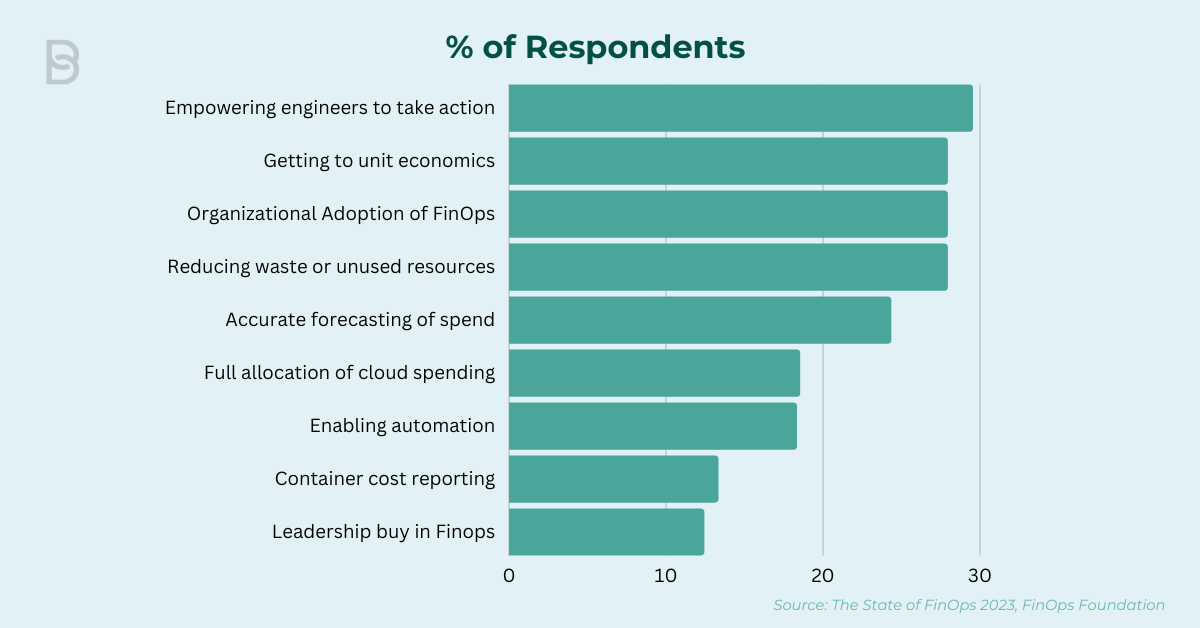
Contents
Ontvang de beste CloudBilling-content van de week
Managed Service Providers (MSPs) have to deal with both great opportunities and significant risks. Among these challenges, one major problem is revenue leakage. Within this landscape filled with potential challenges, one subtle but significant danger stands out – the leakage of revenue.
To tackle this issue, collaborative efforts like FinOps with Cloud Providers have been introduced in recent years, a practice that's proven essential, as underscored by research from the FinOps Institute (see study below).

Revenue leakage in Cloud Services is a tricky problem that requires careful attention and precision. In this blog, we will delve deeper into this issue and explore effective solutions.
Preventing Revenue Leakage: The Importance of Accurate Cloud Billing
The first major reason for the cause of revenue leakage within cloud environments is the failure to bill for utilized resources or underbilling them.
This often occurs due to inaccuracies or omissions in account information, such as mistakenly categorizing active customers as inactive or applying incorrect billing rates.
In order to prevent these losses, employing dedicated cloud monitoring tools and conducting routine audits becomes crucial. These measures guarantee accurate billing for all consumed resources and help mitigate revenue leakage in this context.
Let's take the example of a large enterprise that uses hundreds of virtual machines (VMs). If just one VM is mistakenly marked as inactive, it could result in significant financial losses over time. Managed Service Providers (MSPs) can rectify these potential revenue losses by introducing cloud monitoring tools designed to address such inaccuracies.
Billing Errors in the Cloud - A Threat to Trust and Revenue
Mistakes in cloud service invoicing not only result in revenue losses but can also lead to loss of customer trust. These errors often happen because of human mistakes and inconsistencies in the billing system. With the implementation of cloud-specific billing, automation can significantly reduce manual errors.
Additionally, real-time reconciliation processes tailored for cloud billing structures can swiftly identify and rectify these mistakes, effectively safeguarding both revenue streams and customer satisfaction.
Consider this scenario: When a company receives a bill for services they never actually used, it can raise doubts about the Managed Service Provider's (MSP) competence and integrity.
The timely detection and correction of such mistakes through automated real-time reconciliation processes play a pivotal role in rebuilding trust and preventing subsequent revenue losses. This dual benefit not only safeguards the bottom line but also ensures a strong, enduring relationship with valued customers.
Additionally, in the pursuit of delivering top-notch services, MSPs should consider 'How MSPs can Increase Customer Satisfaction with Automation' to enhance their customer service practices.
Avoiding Revenue Decline: The Challenge of Cloud Subscription Renewals
For many Managed Service Providers (MSPs), cloud subscriptions form a crucial part of their income. When the renewals of these subscriptions are not managed well, they can lead to customers canceling or delaying renewals, which can seriously impact the recurring revenue.
The introduction of specialized automated tracking systems designed explicitly for monitoring cloud subscription renewals and proactive communication with customers about upcoming renewals can significantly reduce this kind of revenue loss. This approach not only ensures continued customer satisfaction but also preserves valuable recurring revenue.
Here's an example to illustrate the point: Consider a scenario where a customer is approaching a subscription renewal date. To prevent the cancellation of the subscription, the MSP can employ automated tracking systems that send timely reminders. These reminders serve to maintain uninterrupted service, keeping customers satisfied and ensuring that the recurring revenue remains intact.
Adapting to Market Dynamics - The Role of Cloud Offerings and Pricing Strategies
In the rapidly changing and competitive cloud market, the ability to swiftly introduce new products and adjust pricing strategies is a critical success factor. Yet, a billing system that is overly complex or inflexible can act as a roadblock for Managed Service Providers (MSPs) looking to respond effectively to evolving market demands and customer expectations.
The solution lies in adopting a cloud-centric billing system that prioritizes flexibility and adaptability. With such an agile approach, MSPs can seamlessly roll out new products and fine-tune pricing strategies in sync with the dynamic cloud market landscape, all without causing disruptions to ongoing billing operations.
For instance, imagine an MSP needing to introduce a new cloud security feature to stay competitive against a rival who's quicker to market. With a flexible billing system in place, this MSP can bring these new offerings and pricing adjustments to market promptly, ensuring they don't miss out on valuable opportunities that can be gained by keeping pace with market trends.
Streamlining Cloud Usage Data for Revenue Protection
A less obvious but equally critical source of revenue leakage is the inefficient management of cloud usage data. When cloud usage data is not accurately tracked and managed, it can result in billing discrepancies. This challenge necessitates the implementation of a sophisticated tracking system capable of precisely capturing and translating all aspects of cloud consumption into accurate billing.
To tackle this issue, integrating cloud-native tools with billing systems and implementing ongoing monitoring and data validation are essential steps. These measures guarantee that every unit of consumption is billed with precision, thus reducing the likelihood of revenue leakage.
For instance, consider a scenario where an MSP struggles to track the usage data of a newly launched application across a global network. Such difficulties can lead to billing inconsistencies. Therefore, it becomes evident that precise tracking systems are indispensable for ensuring accurate billing, safeguarding revenue, and maintaining customer trust.
Preventing Revenue Leakage with CloudBilling
Understanding the intricate landscape of revenue leakages in Cloud Services goes beyond mere operational efficiency; it's a strategic imperative. Each leakage point represents both a challenge and an opportunity for MSPs to refine their systems, reinforce customer trust, and ultimately safeguard their profits.
In this journey to resolve revenue leakages, CloudBilling emerges as a strategic ally. CloudBilling's comprehensive suite of solutions is designed to seamlessly integrate with your cloud-based services, ensuring that every aspect of your billing process is optimized for accuracy and efficiency. By partnering with CloudBilling, you gain the advantage of a robust billing system that is finely tuned to the nuances of cloud service provision, offering flexibility, precision, and adaptability.
With CloudBilling as your ally, you can confidently navigate the complexities that arise in the world of cloud services. As you explore the path to secure your profits and strengthen your position in the cloud market, scheduling a demo with CloudBilling today is your first step towards a thriving and prosperous cloud-based business.
Are you ready to fortify your profits and take your cloud business to new heights? Schedule a demo below with CloudBilling now!








